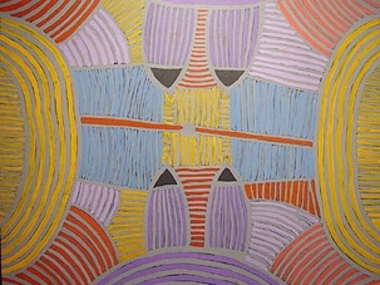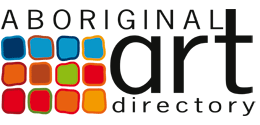Ada Bird Petyarre c. 1930 - 2009

Mountain Devil Lizard Dreaming, depicting Ada Bird's Awelye body paint design. Painted November 2003 at 120 x 178 cms. Image kindly supplied by Mbantua Gallery in Alice Springs
Jeremy Eccles | 15.07.09
Author: Jeremy Eccles
News source: press release
Acclaimed Utopia artist, Ada Bird Petyarre, well known for the breast paint-ups of her Awelye (body paint designs) and for Arnkerrthe (Mountain Devil Lizard) paintings, passed away peacefully on Sunday 28th June. Famous for her bubbly personality, Ada was the eldest of the 'Seven Petyarre Sisters' (Kathleen, Gloria, Nancy, Violet, Myrtle and Jean) from Mulga Bore and became well known in art circles for painting with bright colours at a time when many at Utopia weren't doing so.
Ada Bird Petyarre was born around 1930 on the old Utopia station at Atnangkere. An Anmatyerr speaker, and, at the end of her life one of the senior women on Utopia, she also painted a variety of other Dreaming images including Bush Bean, Emu, Pencil Yam, and Grass Seed in common with Emily Kngwarreye and Gloria Petyarre.
Having created batiks since the first workshop at Utopia in the late 1970’s, she emerged as a dynamic participant in the ‘Summer Project’ organised by Rodney Gooch of the Central Australian Aboriginal Media Association, CAAMA in 1988. This workshop was to play a vital role in introducing women into what was, at the time, a male dominated activity. Ada was then recognised for her important cultural role and her talent as an artist with the National Gallery of Australia in Canberra acquiring a major canvas in 1989, followed in quick succession by a number of other important public and private collections including the Art Gallery of New South Wales, the University of Queensland, the Holmes a Court Collection and the Kelton Foundation in Santa Monica, USA, In 1990 Ada Bird’s first solo exhibition was held at Utopia Art in Sydney.
Her works incorporate both traditional designs and representational elements and are best known for their sinuous, flowing bands of colour and minimal ornamentation. Yet many of her most admired works, including that in the National Gallery of Australia are distinguished by fine, variously coloured dotting. These works, though rare, have proven to be particularly collectable. In 1990, Ada Bird made the first screen-print by a Utopia artist, and continued to make woodblock prints throghout her career.
With an impressive exhibition history and a strong presence in the literature Ada Bird is one of Aboriginal Australia’s most long-lasting artists, though her painting has been slightly out of fashion in recent years. Her batik work, however – some produced during a cross-cultural workshop in Jogjakarta in 1994 – has been particularly admired at the NGV; touring in their Raika Wara show in 1998/9 and again in Across the Desert in 2008/9. She was married to fellow artist, Lyndsay Bird Mpetyane, and suffered a stroke in 2004
The highest price achieved for a work by Ada Bird at auction was the $27,600 paid for Atnangkere (Awelye) 1990 that had a Delmore Downs provenance, and had been exhibited at the Haywood Gallery, London, the Kunstsammlung Nordrhein-Westfalen in Dusseldorf and Gallery Gabrielle Pizzi, Melbourne.
URL: www.mbantua.com.au
Share this:
»  del.icio.us
»
del.icio.us
»  Digg it
»
Digg it
»  reddit
»
reddit
»  Google
»
Google
»  StumbleUpon
»
StumbleUpon
»  Technorati
»
Technorati
»  Facebook
Facebook
Contact Details
Further Research
Artists: Ada Bird Petyarre | Gloria Petyarre | Lyndsey Bird Mpetyane
News Tags: Ada Bird Petyarre | Mbantua Gallery | National Gallery of Victoria | Rodney Gooch | Utopia
News Categories: Feature
News Archive
- 11.10.17 | RETURN OF MUNGO MAN
- 10.10.17 | TARNANTHI 2017
- 11.08.17 | Natsiaas 2017
- 08.08.17 | ABORIGINAL ART ECONOMICS
- 02.08.17 | SCHOLL'S NEXT MOVE
- 20.07.17 | APY ART DOMINATES THE WYNNE
- 17.07.17 | Anangu Artist Wins $100,000 Prize
- 14.07.17 | The End of AAMU
- 13.07.17 | YOU ARE HERE
- 11.07.17 | ART ACROSS THE COUNTRY
- 11.07.17 | TARNANTHI IN OCTOBER
- 05.07.17 | TJUNGUṈUTJA - from having come together
- 02.07.17 | BENNELONG
- 27.06.17 | JIMMY CHI
- 23.06.17 | Blak Markets at Barangaroo
Advertising

